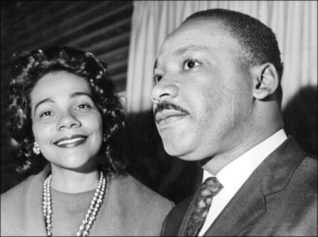In 1964, as Martin Luther King was still rising in stature as leader of the remarkably successful Civil Rights Movement, J. Edgar Hoover’s FBI agents sent King an astounding letter—which they hoped King would think was from an unidentified member of the public—urging the leader to kill himself or risk having his extramarital sexual wanderings released to the public.
While the existence of the letter has been known for some time, Yale history professor Beverly Gage stumbled upon an unredacted version of the letter while researching a book on Hoover. She writes about its shocking contents in today’s New York Times, calling the so-called “suicide letter” the “most notorious and embarrassing example of Hoover’s F.B.I. run amok.”
Filled with typos and misspellings, the letter affected the tone of what Gage called “a disappointed admirer,” supposedly a Black man, and told King he was a man of “hidious [sic] abnormalities.”
Hoover had become obsessed with King by 1964, particularly after the passage of the Civil Rights Act and King winning the Nobel Peace Prize. Hoover felt that King’s moral failings should disqualify him from leadership, and the FBI director tried to feed stories to the media of King’s sexual proclivities. But reporters, living in a very different age than ours, were not interested in King’s sex life, outraging Hoover.
So as described by Gage in her Times essay, one of Hoover’s deputies, William Sullivan, sat down and wrote the letter, then sent an agent to Miami to mail the package to King’s home in Atlanta.
“You are a colossal fraud and an evil, vicious one at that,” the letter said, going on to describe King’s alleged lovers as “filthy dirty evil companions” and “evil playmates,” engaged in “dirt, filth, evil and moronic talk.”
“What incredible evilness,” the letter proclaims, listing off “sexual orgies,” “adulterous acts” and “immoral conduct” and calling King an “evil, abnormal beast.”
The letter tells King to “lend your sexually psychotic ear to the enclosure” and says that he would be given 34 days “before your filthy, abnormal fraudulent self is bared to the nation.”
“There is only one thing left for you to do,” the author warns vaguely at the end of the letter. “You know what it is.”
King’s wife, Coretta Scott King, actually opened the package and gave it to her husband, who knew right away that it was the work of Hoover’s FBI, according to David Garrow’s award-winning King biography.
“Today it is almost impossible to imagine the press refusing a juicy story. To a scandal-hungry media, the bedroom practices of our public officials and moral leaders are usually fair game,” Gage writes. “And a sex scandal is often — though not always — a cheap one-way ticket out of public life. Faced with today’s political environment, perhaps King would have made different decisions in his personal affairs. Perhaps, though, he never would have had the chance to emerge as the public leader he ultimately became.
“Luckily, in 1964 the media were far more cautious. One oddity of Hoover’s campaign against King is that it mostly flopped, and the F.B.I. never succeeded in seriously damaging King’s public image,” she continues. “Half a century later, we look upon King as a model of moral courage and human dignity. Hoover, by contrast, has become almost universally reviled. In this context, perhaps the most surprising aspect of their story is not what the F.B.I. attempted, but what it failed to do.”
Gage says that the current F.B.I. director, James Comey, keeps a copy of the King wiretap request on his desk “as a reminder of the bureau’s capacity to do wrong.”
But she points out the King letter of 50 years ago comes back to us at a time when our intelligence agencies are busy collecting confidential information on Americans, under the guise of protecting national security.
“Much of the conversation swirls around the possibility that agencies like the N.S.A. or the F.B.I. will use such information not to serve national security but to carry out personal and political vendettas,” she concludes. “King’s experience reminds us that these are far from idle fears, conjured in the fevered minds of civil libertarians. They are based in the hard facts of history.”


